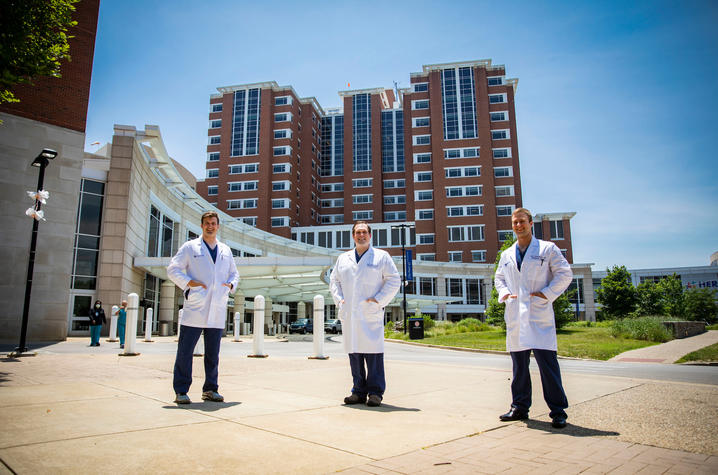Orthopaedic Trauma Research Fellowship Offers Second Chance for Medical Students

With July 1 upon us, many new interns — recent medical school graduates — will be starting residency programs at the University of Kentucky. These residents have been waiting since Match Day in March when they found out where their training would take them. Some medical students however, take a different path before starting their residency.
Match Day, a uniform system by which residency candidates and residency programs simultaneously “match” to fill first-year and second-year post-graduate training positions accredited by the Accreditation Council for Graduate Medical Education (ACGME) was designed to make the process of finding a residency fair and less stressful for candidates. But it doesn’t always work as intended. Sometimes highly qualified applicants are left without a position – some of the most exceptional candidates don’t match.
Imagine the anticipation: The exhausting hours spent studying and in class, the countless cups of coffee and all the stress that medical school brings – only to find out you don’t have a spot. It’s a life defining moment.
Dr. Paul Matuszewski, assistant professor of Orthopaedic Surgery in the University of Kentucky College of Medicine and director of Orthopaedic Trauma Research, understands firsthand the frustration associated with students wondering, “What do I do now?”
“Too often candidates who do not match are told they ‘were guaranteed to match', ‘don’t worry, you’ll do fine’ and ‘you slipped through the cracks,’” said Matuszewski. “Unfortunately, these words aren’t helpful for these students.”
Medical school graduates in this position can chose to work a year in another specialty, abandon their chosen specialty, or get involved in research involving their specialty of choice. These positions unfortunately, are not always available, and not created equally.
“What they really need is mentorship,” said Matuszewski.
Matuszewski, a seasoned surgeon, professor and now mentor, understands this need because after his time in medical school, he did not receive a match on his first try.
Matuszewski was recruited in part to UK HealthCare’s Department of Orthopaedic Surgery and Sports Medicine to help build orthopaedic trauma research. As the program continued to grow with multiple staff, he made a promise that he would always have at least one spot for these types of students in the program. His goal: Give students who will be great physicians the chance to grow and continue to learn while improving their chances of getting the spot they deserve.
Thus, the UK Orthopaedic Trauma Surgery Research Fellowship was born. The program is for those who don’t receive a match to receive mentorship and experience to improve their resumé. UK’s program is one year, which gives fellows the time to reapply for residency programs by the next Match Day.
“These students need to be given the direction I received, and then some,” said Matuszewski. “Our goal is to foster these students, engage them in research like they’ve never seen, and teach them to succeed.”
The program is just finishing its fourth year and over that time has kept a 100% rematch rate. In other words, everyone who has enrolled in the fellowship has matched with a residency program the following year.
This year’s fellows, Drs. Gavin Hautala and Eric Abbenhaus, did not attend the UK College of Medicine. However, after their year of mentorship from Dr. Matuszewski, they have flourished and shown what they are capable of, and have been chosen by the department to be orthopaedic residents at UK HealthCare.
“This program helped us go from being ‘not wanted,’ or ‘leftovers,’ to becoming the most well-rounded and qualified candidates,” said Abbenhaus.
In fact, the fellows both received more interviews for positions than possible to attend in this year’s match.
“What changed?” said Matuszewski, “they just got the opportunity to really highlight what they were capable of and programs realized what they could be missing.”
Today, many medical institutions have programs for students who don’t receive a match, unlike how things were when Matuszewski was a medical student. Hautala said he applied to several orthopaedic fellowships after not matching, but the personal mentorship is what set UK apart from the rest.
“After interviewing with a lot of other programs, I had the impression that I would have been more of a ‘lab rat,’ per se, rather than an aspiring surgeon,” said Hautala. “After interviewing with Matuszewski, the choice became obvious. He understood exactly what it feels like to be unmatched and deeply cared about helping us succeed.”
In addition to the experience and mentorship, this program offers fellows something that is hard to come by in the competitive field of medicine – a second chance.
“I think the most important thing our program offers to the fellows is the combination of hope and guidance,” said Matuszewski. “When they complete the program, they now have hope they will succeed, and they know they are not in this alone.”
More from this series Research Support
Credits
Grace Colville (Publice Relations and Strategic Communications)


